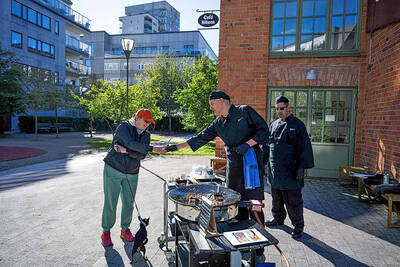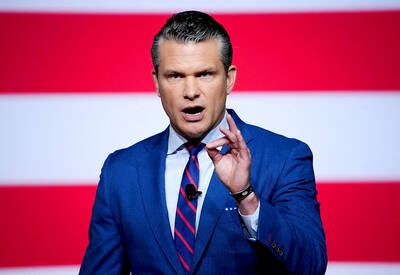Venezuelan President Hugo Chavez's government announced a decree giving officials the power to take control of food distributors caught hoarding or halting supply, a move aimed at easing severe shortages of meats, milk and sugar in Venezuela's supermarkets.
The decree -- part of the government's sweeping reforms toward socialism under Chavez -- will likely stoke continuing fears over threats to private property, particularly among supermarket owners and food storage companies.
Industry and Commerce Minister Maria Cristina Iglesias told a news conference that the legislation will take effect upon its publication in the official gazette this week.
Industry officials blame the shortages on price controls that oblige retailers to sell at a loss, while the government points the finger at unscrupulous speculators, including supermarket owners and distributors, who hoard food or boost prices.
Iglesias said the law would give the government, along with municipal authorities and "communal councils," or neighborhood assemblies, authority over food distribution and sales if private companies such as supermarket chains halt their operations.
The forthcoming decree "puts ... food commercialization in the hands of the people and the revolutionary government," she said.
Iglesias did not provide specific details of the decree, saying only that the new legislation would "permit, in extreme cases, the re-establishment of an essential public service."
The Venezuelan National Assembly, which is entirely controlled by a coalition of pro-Chavez parties, approved a law last month that granted the Venezuelan leader authority to enact sweeping measures by presidential decree as his government steers this poverty-stricken South American country toward socialism.
Privately owned supermarkets suspended sales of beef earlier last week after one chain was shut down for 48 hours for pricing meat above government-set levels. Most items can still be found, but only by paying higher prices at grocery stores or on the black market.
Authorities have raided warehouses and confiscated tonnes of food -- mostly beef and sugar -- they said was hoarded by vendors unwilling to sell inventories at the official price.
Iglesias urged Venezuelans to provide authorities with information regarding distribution chains or storage facilities where goods are being hoarded so the food could be confiscated and sold directly to consumers.
Full-page government ads published in newspapers on Sunday showed a fake mug shot under the title "The Hoarder Is a Criminal" and warned consumers not to purchase foods at exorbitant prices.

READINESS: According to a survey of 2,000 people, 86 percent of Swedes believe the country is worth defending in the event of a military attack Swedes are stocking up on food items in case of war, as more conflict in Europe no longer feels like a distant possibility, and authorities encourage measures to boost readiness. At a civil preparedness fair in southwest Stockholm, 71-year-old Sirkka Petrykowska said that she is taking the prospect of hostilities seriously and preparing as much as she can. “I have bought a camping stove. I have taken a course on preservation in an old-fashioned way, where you can preserve vegetables, meat and fruit that lasts for 30 years without a refrigerator,” Petrykowska said. “I’ve set aside blankets for warmth, I

FRUSTRATIONS: One in seven youths in China and Indonesia are unemployed, and many in the region are stuck in low-productivity jobs, the World Bank said Young people across Asia are struggling to find good jobs, with many stuck in low-productivity work that the World Bank said could strain social stability as frustrations fuel a global wave of youth-led protests. The bank highlighted a persistent gap between younger and more experienced workers across several Asian economies in a regional economic update released yesterday, noting that one in seven young people in China and Indonesia are unemployed. The share of people now vulnerable to falling into poverty is now larger than the middle class in most countries, it said. “The employment rate is generally high, but the young struggle to

ENERGY SHIFT: A report by Ember suggests it is possible for the world to wean off polluting sources of power, such as coal and gas, even as demand for electricity surges Worldwide solar and wind power generation has outpaced electricity demand this year, and for the first time on record, renewable energies combined generated more power than coal, a new analysis said. Global solar generation grew by a record 31 percent in the first half of the year, while wind generation grew 7.7 percent, according to the report by the energy think tank Ember, which was released after midnight yesterday. Solar and wind generation combined grew by more than 400 terawatt hours, which was more than the increase in overall global demand during the same period, it said. The findings suggest it is

‘ARMED CONFLICT’: At least 21 people have died in such US attacks, while experts say the summary killings are illegal even if they target confirmed narcotics traffickers US forces on Friday carried out a strike on an alleged drug-smuggling boat off the coast of Venezuela, killing four people, US Secretary of Defense Pete Hegseth said. The latest strike, which Hegseth announced in a post on X, brings the number of such US attacks to at least four, leaving at least 21 people dead. An accompanying video shared by Hegseth showed a boat speeding across the waves before being engulfed in smoke and flames. “Four male narco-terrorists aboard the vessel were killed,” the Pentagon chief wrote. He said the strike “was conducted in international waters just off the